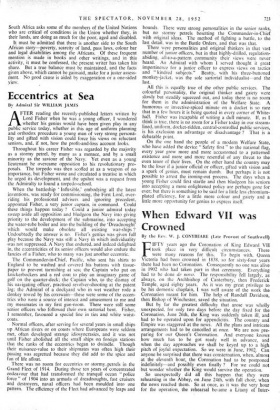Eccentrics at Sea
By Admiral Sir WILLIAM JAMES
AFTER reading the recently-published letters written by Lord Fisher when he was a young officer, I wondered whether his genius would have been given play in any public service today, whether in this age of uniform planning and orthodox procedure a young man of very strong persona- lity and gifted with vision could force his views on reluctant seniors, and, if not, how the profit-and-loss account looks.
Throughout his career Fisher was regarded by the majority as a stormy petrel, by many as a menace, and by a small minority as the saviour of the Navy. Yet even as a young lieutenant he overcame opposition to his revolutionary pro- posals. The torpedo was then scoffed at as a weapon of no importance, but Fisher wrote and circulated a treatise in which he urged its development, and the upshot was a request from the Admiralty to found a torpedo-school.
When the battleship 'Inflexible,' embodying all the latest inventions, was ready for commissioning, the First Lord, over- riding his professional advisers and ignoring precedent, appointed Fisher, a very junior captain, in command. Could these things happen today ? Could a junior admiral today sweep aside all opposition and bludgeon the Navy into giving priority to the development of the submarine, into accepting the water-tube boiler and into the building of the 'Dreadnought' which would make obsolete all existing war-ships ? Undoubtedly the answer is no. Fisher's genius was given full play because the Navy was still a Navy in which individuality .was not suppressed. A Navy that endured, and indeed delighted in, the eccentricities of its senior officers would also endure the fancies of a Fisher, who to many was just another eccentric.
The Commander-in-Chief, Pacific, who sent his shirts to England to be washed and covered his buttons with tissue- paper to prevent tarnishing at sea; the Captain who put on knickerbockers and a red coat to play an imaginary game of golf on the quarter-deck; the Captain who, to the dismay of his navigating officer, practised revolver-shooting at the patent log; the Admiral of a dockyard who in wet weather rode a donkey towed by his coxswain—these were some of the eccen- trics who were a source of interest and amusement to me and my messmates in my first gun-room. There were still some senior officers who followed their own sartorial bent. Fisher, I remember, favoured a special line in ties and white waist- coats.
. Normal officers, after serving for several years in small ships up African rivers or on coasts where Europeans were seldom met, often developed strange idiosyncrasies, and it was not until Fisher abolished all the small ships on foreign stations that the ranks of the eccentrics began to dwindle. Though their nuisance-value to their shipmates was• often high their passing was regretted because they did add to the spice and fun of life afloat.
There was no room for eccentrics or stormy.petrels in the Grand Fleet of 1914. During those ten years of concentrated endeavour that had transformed the tranquil ocean "police force" of 1904 into an armada of dreadnoughts, fast cruisers and destroyers, naval officers had been moulded into one pattern. The efficiency of the Fleet had advanced by leaps and bounds. There were strong personalities in the senior ranks, but no stormy petrels besetting the Commander-in-Chief with original ideas. The method of fighting a battle, to the last detail, was in the Battle Orders, and that was that.
There were personalities and original thinkers in that vast number of junior officers, but in that highly-drilled, regulation- abiding, all-to-a-pattern community their views were never heard. An Admiral with whom 1 served thought it great impertinence for a junior officer to express views on tactics and "kindred subjects." Beatty, with his three-buttoned monkey-jacket, was the sole sartorial individualist—and the last.
All this is equally true of the other public services. The colourful personality, the original thinker and gaiety were slowly but steadily squeezed out, and today there is no room for them in the administration of the Welfare State. A humorous or invective-spiced minute on a docket is so rare that in a few hours it is being quoted in every corner of White- hall. Fisher was incapable of writing a dull minute. If, as I think is true, there is no room for a Fisher today in our stream- lined, uniform, docket-ridden, central-controlled public services, is his exclusion an advantage or disadvantage ? That is a debatable point.
On the one hand the people of a modern Welfare State, who have added the device "Safety first" to the national flag, every year grow more and more accustomed to a patterned existence and more and more resentful of any threat to the even tenor of their lives. On the other hand the country may be the loser if a junior official or officer, gifted with vision and a spark of genius, must remain dumb. But perhaps it is not possible to arrest the ironing-out process. The days when a young Fisher could first startle and then bludgeon his seniors into accepting a more enlightened policy are perhaps gone for ever; but there is something to be said for a little less chromium- plated efficiency, for a little more colour and gaiety and a little more opportunity for genius to express itself.


































 Previous page
Previous page